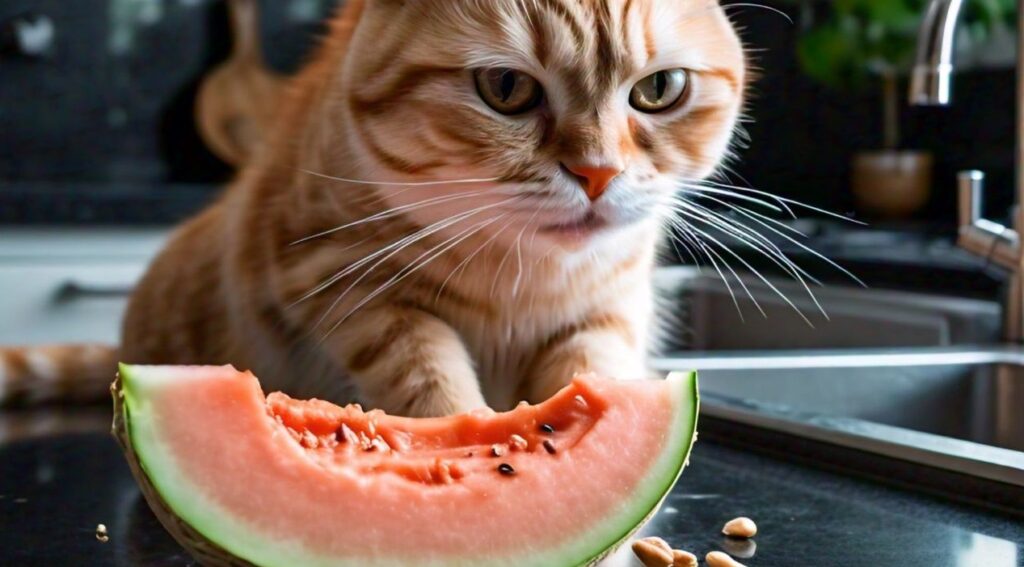Summer heat calls for refreshing treats, and that juicy slice of rockmelon might seem like the perfect way to cool down you and your feline friend. But before you share a bite, consider this: Is Rockmelon Safe for Cats? The answer might surprise you. While cats are known for their curious nibbles, rockmelon might not be the best choice for their digestive system. Let’s delve into why…
Is Rockmelon Safe for Cats? The Sugar Dilemma:
Rockmelon is packed with natural sugars, which can be a double-edged sword for cats. While a small amount might not cause immediate harm, their digestive systems are not well-equipped to handle high sugar intake. This can lead to unpleasant consequences like upset stomach, diarrhea, or even pancreatitis, a painful inflammation of the pancreas.

Choking Hazards and Digestive Blockages:
The tough outer rind of the rockmelon poses a choking hazard for your curious kitty. Additionally, the seeds can be a cause for concern. Unlike humans, cats lack the enzymes necessary to break down these seeds, which can lead to digestive blockages and require veterinary attention.
Carnivores by Design:
Cats are obligate carnivores, meaning their bodies are specifically designed to thrive on a diet rich in animal protein. Fruits like rockmelon offer little to no nutritional value for them. Their digestive systems are geared towards processing meat, and introducing a sugary fruit like rockmelon can disrupt their delicate gut balance.
Temptation vs. Well-being:
The sweetness of rockmelon might pique your cat’s curiosity, but it’s important to remember that their dietary needs differ vastly from ours. Sharing your favorite fruits can be tempting, but prioritizing your cat’s health is paramount.
Safe and Satisfying Alternatives:
Instead of rockmelon, there are plenty of cat-safe treats available that won’t upset their digestive system. Look for commercially prepared treats formulated specifically for felines, or offer a small amount of cooked, lean meat as an occasional treat.
When in Doubt, Consult Your Vet:
This information is for general knowledge only and should not be considered a substitute for professional veterinary advice. If you have any concerns about your cat’s diet or suspect they’ve ingested rockmelon, consult your veterinarian immediately.
The Final Scoop:
While sharing a refreshing treat with your feline friend is a kind gesture, rockmelon isn’t the best choice. Stick to a balanced diet recommended by your veterinarian and opt for cat-approved treats to keep your furry companion cool, happy, and healthy this summer.
Learn More: Are Hypoallergenic Cats Good For Allergic People

Rockmelon and Cats: Frequently Asked Questions
1. Can cats safely eat rockmelon?
No, it’s not recommended. While a tiny amount might not cause immediate harm, the high sugar content and potential for digestive issues make rockmelon unsuitable for feline consumption.
2. What are the risks of feeding rockmelon to cats?
- Sugar overload: Rockmelon’s natural sugars can upset your cat’s stomach, leading to diarrhea or pancreatitis.
- Choking hazard: The tough rind poses a choking risk, especially for curious kittens.
- Digestive blockages: Seeds can cause blockages in your cat’s digestive system, requiring veterinary attention.
3. Are there any benefits for cats eating rockmelon?
No, cats are obligate carnivores and gain no nutritional value from rockmelon. In fact, it can disrupt their gut health.
4. What should I do if my cat eats rockmelon accidentally?
Monitor your cat closely for any signs of discomfort like vomiting, diarrhea, or lethargy. If you notice any concerning symptoms or suspect they consumed a large amount, contact your veterinarian immediately.
5. What are some safe alternatives to rockmelon for cats?
There are plenty of cat-safe treats available! Look for commercially prepared treats formulated specifically for felines. You can also offer a small amount of cooked, lean meat as an occasional treat.


